birds
∞
Bluejay Linings
"Well, look at the silver lining!"
An accident two years ago left me with some injuries that occasionally keep me from doing what I would like to do. I shouldn't complain; my life's pretty good. But even little pains seem to draw all my attention. If my whole body is fine but I've got a blister on my small toe, I can forget the beautiful landscape I'm in and focus instead on the blister, or on the hiking boots that rubbed too much while I climbed a once-in-a-lifetime mountain. A splinter in my finger gets more of my attention than my wife's hand in mine does. Even small pain can keep my mind from noticing great loveliness.
Occasionally, my injuries keep me from being able to drive. When I cannot drive I rely on bicycling, and then I see much more clearly how much my city has been shaped by the automobile. We have very few taxis, and not much by way of public transit. Our city is in a place where land is cheap and abundant, and the sprawling grid of streets and of wide green lawns is a response to the availability of land: it's not a walking city, it's a city for driving. There are some nice bike trails, but they're mostly an afterthought that are designed for recreation and not for transportation. Here in Sioux Falls, the private car rules the road.
I own several cars, and my cars are also a response to the land here, and to its weather. The open prairie can get very cold in winter, and very hot in the summer. In my lifetime, automobiles have become better and better at insulating me from the extremes of weather. I can drive a thousand miles without feeling the air other than when I stop for rest or fuel. This usually seems like an advantage. Sometimes I wish I could talk with other drivers, but we are insulated from one another, too.
A few days ago someone told me that having to rely on my bicycle is a gift, an advantage. "Look at the silver linings," they said. When you bike, you get exercise! I think they meant to console me, and I'm sure I've said the same kind of thing to others, hoping to boost their spirits by pointing out that things could be worse. And I'll probably wind up doing it again in my lifetime. It's so easy to feel insulated from others' pain, and so hard to know the effects of our words on others. Argh. If I've done that to you, I'm sorry.
*****
Last January, as I walked through the forest of Petén, Guatemala with my students, I kept saying to them the last three lines from Gary Snyder's poem, "For the Children." Those lines form a sort of haiku at the end of a longer poem:
stay together
learn the flowers
go light
I keep returning to that poem. Some of the hills are hard to climb, and I know that some of them will give me blisters. Others...well, someday those once-in-a-lifetime mountains will be climbable only in my memory.
For now, I'm trying not to let the well-intended words about "silver linings" rub me the wrong way, and to take them in the spirit they're offered in. They may be awkward, but they're meant to help.
From my three-wheeled vélo, uninsulated from the weather, I find I am also exposed to the sound of the birds. I haven't learned all the flowers yet, and I'm still working on the birdsongs, but I know many of their voices. In the last month I've learned where the bluejays live in my neighborhood. I didn't know we had bluejays near my house. I've seen them in our city, but only rarely. Now I've found two pair, and I'm starting to figure out which are their favorite trees. As I roll along quietly on my recumbent trike, the birds let me coast past them, eyeing me perhaps, as I listen for them high in the treetops of this prairie town.
∞
Thoreau writes that not many people know the art of Walking. I am trying to learn it, and I think part of it involves learning to see what is there. My friend Scott Parsons has helped me to see better by teaching me to draw, since the pencil forces me to pay attention to what I actually see rather than just what I think I see.
Lately I have been trying to walk more - that is, to Walk more - in and around my city, Sioux Falls. I find, as I step off the sidewalks and walk a little more transgressively, the city is transformed. The habits of sidewalks and cars speed up the world around us until much of it vanishes in a blur.
Thoreau recommends trans-gressing, that is, stepping across paths and fences rather than letting them herd us to the destinations that habit and tradition and fetishized commerce want to lead us. Once he wrote that we should sometimes bend over and look at the world upside down. Sometimes this is all the "transgression" that is needed to overcome the aggressive habits that constrain us in daily life.
Another tool I have used lately is the camera, peering down its glassy pipe at single, simple things, trying to break up the landscape by gazing intently at just one point. Or, at times, using the lens to draw the world together, to see how much I can gather into its frame.
When I first moved to Sioux Falls almost ten years ago I thought it was a homely place, a city that did not care for design or good planning or beautiful architecture. Slowly, one frame at a time, I am changing my own mind. As I Walk through and around it, I am coming to see that it is, at times and in places, quite a lovely place to live.
Walking In Nature - In Sioux Falls
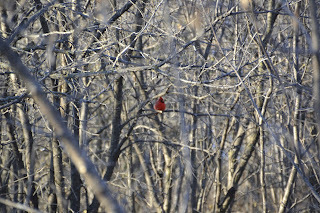 |
| Cardinal in Tuthill Park, Sioux Falls |
Lately I have been trying to walk more - that is, to Walk more - in and around my city, Sioux Falls. I find, as I step off the sidewalks and walk a little more transgressively, the city is transformed. The habits of sidewalks and cars speed up the world around us until much of it vanishes in a blur.
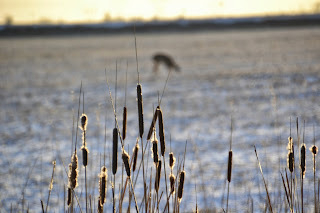 |
| Whitetail deer, east Sioux Falls |
Thoreau recommends trans-gressing, that is, stepping across paths and fences rather than letting them herd us to the destinations that habit and tradition and fetishized commerce want to lead us. Once he wrote that we should sometimes bend over and look at the world upside down. Sometimes this is all the "transgression" that is needed to overcome the aggressive habits that constrain us in daily life.
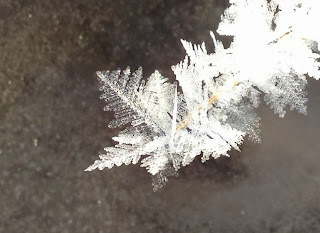 |
| Ice on a single blade of grass on the Augustana College campus |
When I first moved to Sioux Falls almost ten years ago I thought it was a homely place, a city that did not care for design or good planning or beautiful architecture. Slowly, one frame at a time, I am changing my own mind. As I Walk through and around it, I am coming to see that it is, at times and in places, quite a lovely place to live.
∞
A number of times in the last few years I've read statements by prominent scientists about the irrelevance of philosophy, echoing Richard Feynman's famous quip that "Philosophy of science is about as useful to scientists as ornithology is to birds."
Feynman was just talking about philosophers of science, which is just one narrow slice of the philosophic pie. More recently others, like Freeman Dyson, have made broader indictments of philosophy, or like Lawrence Krauss, of the humanities generally.
Dyson, in an article he wrote for the New York Review of Books, described today's philosophers as "a sorry bunch of dwarfs. They are thinking deep thoughts and giving scholarly lectures to academic audiences, but hardly anybody in the world outside is listening. They are historically insignificant." Yes, we have a technical vocabulary that outsiders often have trouble understanding. But that's true of every discipline. And yes, we don't seem to have anyone in our discipline who is writing the next Job or Republic right now, but that's been true almost always. No discipline consistently produces nothing but geniuses. Many of us in every discipline live our careers out bearing the gifts of the past forward to another generation so that they might benefit from them and add to them. And many of us are content to be forgotten as long as the books of wisdom entrusted to us are remembered.
In his recent book A Universe From Nothing, Krauss seems to be at pains to point out that without the sciences, the humanities are virtually useless, and that even with the sciences, the humanities are still virtually useless. His introduction pushes the humanities back at arm's length and invites them to clear out while science handles all the real heavy lifting.
What stands out for me as I read these scientists and some others writing in a similar vein is that they write like they're on the defensive and feeling embattled. My guess is that they see themselves or their disciplines as being engaged in an important fight about cultural values, science education, and research funding. The outsized reaction to Thomas Nagel's recent Mind and Cosmos - with its inflammatory subtitle, "Why The Materialist Neo-Darwinian Conception of Nature Is Almost Certainly False" - suggests that many advocates of the sciences worry about any book that might give comfort to the enemy.
A siege mentality can make us distrustful of everyone, and especially of our critics, no matter how friendly. Dyson, Krauss, and others inclined to sideline the humanities would do well to remember that the humanities give them the tools with which to reason and write about the discoveries of science. If those of us in the humanities seem critical of the sciences, this doesn't mean we're unfriendly. The funny thing about Feynman's dictum is that as long as birds and people try to live together, birds actually do benefit from ornithologists. After all, ornithologists study the birds and their environments, and work to ensure that others see how important it is to preserve them. Of course, the birds in their daily lives will likely never know it.
I should add that philosophers like me benefit from ornithologists, too. I am especially grateful for the ornithologists at Cornell University for putting so much helpful information on their website for bird-watchers and ornithophiles like me.
The bird I have identified as a Cooper's hawk might be a sharp-shinned hawk; I often have trouble distinguishing them. We live on the migration path for ruby-throated hummingbirds, so we see them for two brief seasons, once in the spring and again in the fall. Mourning doves are notoriously poor parents, and we often find they've laid eggs in silly places. Fortunately for their species, they can produce multiple clutches each year.
If you're interested in both birds and philosophy, let me recommend Charles Hartshorne's book Why Birds Sing. Hartshorne suggests that maybe birds sing because they enjoy it. This may seem so obvious as to be silly, but it is a helpful addition to the usual claims that birds sing because singing is useful for mating, staking territorial claims, self-defense, and so on. Hartshorne doesn't allow us to reduce birds to bird-making machines. Which is helpful, because it's a reminder that we, too, are more than human-making machines. It's also good to be reminded that it's okay to sing for the sheer enjoyment of singing.
Do Birds Need Ornithologists?
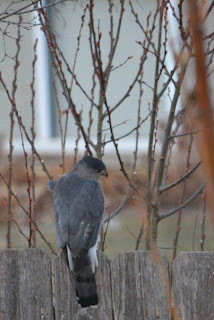 |
| Cooper's hawk in my backyard. |
Feynman was just talking about philosophers of science, which is just one narrow slice of the philosophic pie. More recently others, like Freeman Dyson, have made broader indictments of philosophy, or like Lawrence Krauss, of the humanities generally.
Dyson, in an article he wrote for the New York Review of Books, described today's philosophers as "a sorry bunch of dwarfs. They are thinking deep thoughts and giving scholarly lectures to academic audiences, but hardly anybody in the world outside is listening. They are historically insignificant." Yes, we have a technical vocabulary that outsiders often have trouble understanding. But that's true of every discipline. And yes, we don't seem to have anyone in our discipline who is writing the next Job or Republic right now, but that's been true almost always. No discipline consistently produces nothing but geniuses. Many of us in every discipline live our careers out bearing the gifts of the past forward to another generation so that they might benefit from them and add to them. And many of us are content to be forgotten as long as the books of wisdom entrusted to us are remembered.
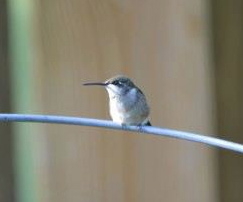 |
| Female ruby-throated hummingbird. |
In his recent book A Universe From Nothing, Krauss seems to be at pains to point out that without the sciences, the humanities are virtually useless, and that even with the sciences, the humanities are still virtually useless. His introduction pushes the humanities back at arm's length and invites them to clear out while science handles all the real heavy lifting.
What stands out for me as I read these scientists and some others writing in a similar vein is that they write like they're on the defensive and feeling embattled. My guess is that they see themselves or their disciplines as being engaged in an important fight about cultural values, science education, and research funding. The outsized reaction to Thomas Nagel's recent Mind and Cosmos - with its inflammatory subtitle, "Why The Materialist Neo-Darwinian Conception of Nature Is Almost Certainly False" - suggests that many advocates of the sciences worry about any book that might give comfort to the enemy.
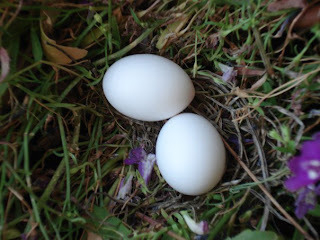 |
| Mourning dove eggs in one of my flower pots. |
******
I should add that philosophers like me benefit from ornithologists, too. I am especially grateful for the ornithologists at Cornell University for putting so much helpful information on their website for bird-watchers and ornithophiles like me.
The bird I have identified as a Cooper's hawk might be a sharp-shinned hawk; I often have trouble distinguishing them. We live on the migration path for ruby-throated hummingbirds, so we see them for two brief seasons, once in the spring and again in the fall. Mourning doves are notoriously poor parents, and we often find they've laid eggs in silly places. Fortunately for their species, they can produce multiple clutches each year.
If you're interested in both birds and philosophy, let me recommend Charles Hartshorne's book Why Birds Sing. Hartshorne suggests that maybe birds sing because they enjoy it. This may seem so obvious as to be silly, but it is a helpful addition to the usual claims that birds sing because singing is useful for mating, staking territorial claims, self-defense, and so on. Hartshorne doesn't allow us to reduce birds to bird-making machines. Which is helpful, because it's a reminder that we, too, are more than human-making machines. It's also good to be reminded that it's okay to sing for the sheer enjoyment of singing.